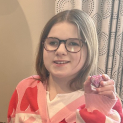Turning Killers into THINKers: TME Hostility-Impervious NK Cells for Treating Neuroblastoma and Sarcoma

Despite attempts to improve treatment over the last few decades, children with advanced neuroblastoma or muscle or bone sarcoma continue to die from their disease. New treatments are sorely needed. Therapies that utilize the immune system to fight cancer, such as use of immune cells called natural killer (NK) cells, have shown promise in the lab. Their ability to cure patients, however, has been limited by a powerful tumor environment that inhibits the immune system. Our lab has been studying the tumor environment of childhood cancers and has discovered two proteins involved in inhibiting the ability of NK cells to survive, multiply, and stay activated to fight tumors. To address this problem, we modified NK cells by genetic engineering technology in two unique ways in order to keep NK cells ‘on’ within the harsh tumor environment. We added an activating signal and deleted an inhibitory signal specifically within NK cells that should safely and durably maintain their activity. We hypothesized that these uniquely co-modified NK cells armed with a tumor-targeting protein called a chimeric antigen receptor (CAR) will multiply, survive, and kill cancer cells in the tumor environments of otherwise resistant childhood solid tumors. We have started to test this hypothesis in unique laboratory models of the tumor environment developed in our lab and have shown thus far an increased ability of these NK cells to kill tumors and stay alive. We expect our findings to result in a new type of NK cell therapy with a potential to increase response rates in future clinical trials of CAR-NK cells.
Project Goals:
Our project has two main goals. First, we want to better understand how the tumor environment of pediatric solid tumors decreases NK cell immune activity, findings that could be broadly applied to enhance NK cell immunotherapies in general. Secondly, we want to deliver a novel cancer therapy that could be used to overcome NK dysfunction in tumor environments, thus providing a means to increase response rates in clinical trials of NK cell immunotherapies for patients with neuroblastoma and pediatric sarcomas.
2025 Update:
To address this problem, we modified NK cells by genetic engineering technology in two unique ways in order to keep NK cells ‘on’ within the harsh tumor environment. We added an activating signal and deleted an inhibitory signal specifically within NK cells that should safely and durably maintain their activity. We hypothesized that these uniquely double-modified NK cells armed with a tumor-targeting protein called a chimeric antigen receptor (CAR) will multiply, survive, and kill cancer cells in the tumor environments of otherwise resistant childhood solid tumors. Our findings thus far show that these modifications separately enhance certain aspects of CAR-NK cells. We are now at the final portion of our project where we combine these modifications to generate optimal anti-tumor effect.

